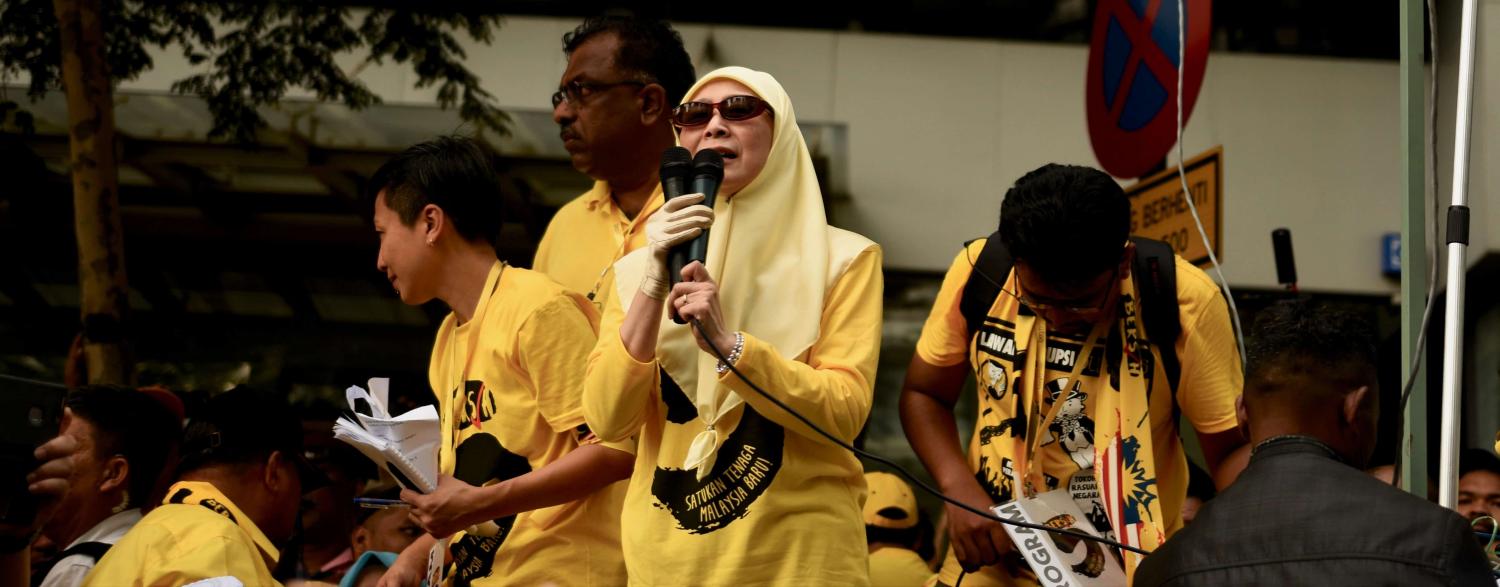For fifth time in less than a decade, thousands of yellow-clad supporters of an electoral reform movement called Bersih (Malay for 'clean') jammed streets in Kuala Lumpur on Sunday in their latest demonstration seeking change.
But for the last year and a half, the group, which is backed by Malaysia’s opposition parties, have been seeking change at the top – the resignation of Prime Minister Najib Razak over lurid corruption allegations involving a state development fund called 1MDB.
Najib is accused of trousering around $US700 billion allegedly siphoned off from 1MDB, public money that was supposed to help Malaysia meet its target of becoming a developed country by 2020 but which allegedly ended up in the prime minister’s personal bank accounts. Najib claimed the money was a Saudi Arabian donation, most of which was repaid. As well as being cleared of wrong-doing by the attorney-general, the prime minister has parried all comers so far, including his own deputy Prime Minister Muhyiddin Yassin, who was fired after criticizing the boss over the allegations of financial impropriety.
Muhyiddin was one of the many prominent opposition politicians who addressed the latest Bersih protest, telling a crowd of around 10,000 people sitting in the shadow of the 379 meter high Petronas Towers that it was time for a new government.
The towers were built during the 22-year premiership of 91-year-old Mohamad Mahathir, Malaysia’s longest serving prime minister and the man who wet-nursed Najib’s political career. But Mahathir, who as leader was quick to crack down on any dissent, has turned on his protege as part of a belated conversion to dissent that saw him standing beside Muhyiddin on the back of a truck on 19 November (both men clad in the signature Bersih yellow) telling the crowd that Malaysia is 'controlled by thieves'.
Najib supporters accuse Mahathir of supporting people he would have crushed were he still in office. 'It is a long list of u-turns that he has done and will continue to do,' Najib said, reminding that Mahathir had criticised Bersih rallies in 2011 and 2012 that ended in chaos, with police firing teargas and water cannons at demonstrators.
The opposition hopes that Mahathir and Muhyiddin, former stalwarts of the United Malays National Organization (UMNO) and the National Front that have run Malaysia since independence from the United Kingdom in 1957, will draw enough support from the silent rural Malay majority to depose Najib at the next election, due by 2018.
Aiming to make history and end six decades of unbroken UMNO rule, Mahathir and Muhyiddin have formed a new party called the Malays United Indigenous Party, which has allied with the rest of the opposition coalition, a disparate amalgam of Islamists, ethnic Chinese and liberal Malays now called Pakatan Harapan, or the Hope Alliance.
But to have a chance at beating UMNO’s entrenched patronage machine, the opposition needs to agree on strategy, and specifically on lining up one candidate to take on government incumbents in constituencies across the country.
Teresa Kok, a lawmaker from the Chinese-Malaysian Democratic Action Party, acknowledged that the opposition coalition has to agree who will run against governing party MP’s in the next election and avoid splitting the opposition vote. 'Mahathir’s party is trying to negotiate seats with PAS, so we need to see how that goes,' she said. PAS, the Malay acronym for the country’s Islamist party, has usually competed UMNO for Muslim Malay votes. Getting their agreement on election strategy might not be easy, given a breakdown in relations between PAS and the DAP in 2015.
'Let us oust aside our differences, this is the time for us to be united,' Muhyiddin thundered, in what was the keynote speech at the 19 November demonstration.
The Bersih rally in 2015 was made up mostly of Chinese-Malaysians, a powerful minority making up almost a quarter of Malaysia’s 30 million people. This time around, perhaps stirred by the presence of Mahathir and Yassin, Malays were more visible among the yellow-clad throng, but enough to worry Najib, who dismissed the protest as a stunt mounted by an opposition unable to win an election?
Ei Sun Oh, a former Najib aide now working at Nanyang Technological University in Singapore, said that 'the rally could galvanize those who are already converted to the opposition, and perhaps turn a few fence-sitters' hearts, but the rural majority are still solidly behind UMNO.' But the prime minister, who contends that Malaysians are 'fed up' of the Bersih protests, must be worried, not just by Mahathir’s incessant sniping. The US Department of Justice is trying to recover assets said to be bought with 1MDB money, all but naming Najib in its suit as 'Malaysian Official 1'.
And on the eve of the rally, Bersih chair Maria Chin Abdullah was arrested, later held in solitary confinement and charged under an anti-terrorism law for attempting to undermine democracy. Also held were leaders of a rival pro-Najib protest, amid fears of street clashes between the two sides. But the dragnet of anti-government voices is nothing new, with opposition leader Anwar Ibrahim jailed on sodomy charges last year, a use of a colonial-era law for what the opposition maintains are political purposes.
'They use institutions like police to oppress us, we saw that yesterday, but we are here anyway,' said Haris Rashid, a supporter of Anwar's People’s Justice Party, speaking during the 19 November rally close to one of the many roadblocks set up by police around Kuala Lumpur.
Chin Abdullah's detention has sparked follow up protests and legal challenges calling for her release. Charles Santiago, an opposition MP, described the crackdown as 'a victory' for the opposition. 'A few days ago people were not showing so much interest [in the protest] but with the intimidation from the government side that changed in the last couple of days,' he said.
Photo: Wan Azizah Wan Ismail, wife of Malaysia’s jailed opposition figurehead Anwar Ibrahim, speaks to protestors in Kuala Lumpur on 19 November 2016. Photo by the author.
